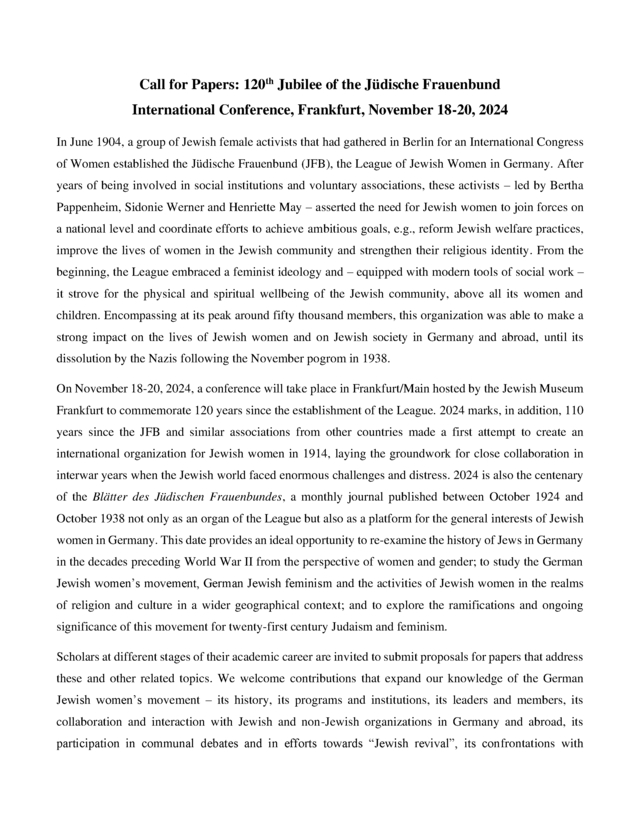Call for Papers: 120th Jubilee of the Jüdische Frauenbund
International Conference, Frankfurt, November 18-20, 2024
In June 1904, a group of Jewish female activists that had gathered in Berlin for an International Congress of Women established the Jüdische Frauenbund (JFB), the League of Jewish Women in Germany. After years of being involved in social institutions and voluntary associations, these activists – led by Bertha Pappenheim, Sidonie Werner and Henriette May – asserted the need for Jewish women to join forces on a national level and coordinate efforts to achieve ambitious goals, e.g., reform Jewish welfare practices, improve the lives of women in the Jewish community and strengthen their religious identity. From the beginning, the League embraced a feminist ideology and – equipped with modern tools of social work – it strove for the physical and spiritual wellbeing of the Jewish community, above all its women and children. Encompassing at its peak around fifty thousand members, this organization was able to make a strong impact on the lives of Jewish women and on Jewish society in Germany and abroad, until its dissolution by the Nazis following the November pogrom in 1938.
On November 18-20, 2024, a conference will take place in Frankfurt/Main hosted by the Jewish Museum Frankfurt to commemorate 120 years since the establishment of the League. 2024 marks, in addition, 110 years since the JFB and similar associations from other countries made a first attempt to create an international organization for Jewish women in 1914, laying the groundwork for close collaboration in interwar years when the Jewish world faced enormous challenges and distress. 2024 is also the centenary of the Blätter des Jüdischen Frauenbundes, a monthly journal published between October 1924 and October 1938 not only as an organ of the League but also as a platform for the general interests of Jewish women in Germany. This date provides an ideal opportunity to re-examine the history of Jews in Germany in the decades preceding World War II from the perspective of women and gender; to study the German Jewish women’s movement, German Jewish feminism and the activities of Jewish women in the realms of religion and culture in a wider geographical context; and to explore the ramifications and ongoing significance of this movement for twenty-first century Judaism and feminism.
Scholars at different stages of their academic career are invited to submit proposals for papers that address these and other related topics. We welcome contributions that expand our knowledge of the German Jewish women’s movement – its history, its programs and institutions, its leaders and members, its collaboration and interaction with Jewish and non-Jewish organizations in Germany and abroad, its participation in communal debates and in efforts towards “Jewish revival”, its confrontations with antisemitism throughout its decades of existence, the influence beyond Germany of this organization and its leaders after their emigration, the perception of the JFB among contemporaries (particularly the attitude of Orthodoxy and other religious currents towards the League), and more. Topics that encourage a comparative perspective are also welcome. These include, but are not limited to, discussions of early Jewish women’s movements and their campaigns in other lands; contemporary Jewish women’s journals and other media; transnational women’s cooperation efforts and organizations; and the resurgence of Jewish women’s movements after World War II in relation to earlier movements. Lastly, we welcome new methodological approaches, such as intersectionality, interdisciplinarity, and digital humanities.
Please send an abstract of your proposed contribution (up to 350 words) and a short bio by January 20, 2024 to Raya Michaeli, leobaeck@leobaeck.org.
Depending on the approval of funds, travel costs will be covered, at least partially.
Organizing committee:
Dr. Irene Aue-Ben-David, Leo Baeck Institute Jerusalem
Prof. Miriam Rürup, Moses Mendelssohn Center for European Jewish Studies
Dr. Kim Wünschmann, Institute for the History of the German Jews in Hamburg
Prof. Abigail Gillman, Boston University
Dr. Anna-Dorothea Ludewig, Moses Mendelssohn Center for European Jewish Studies
Dr. Natalie Naimark-Goldberg
